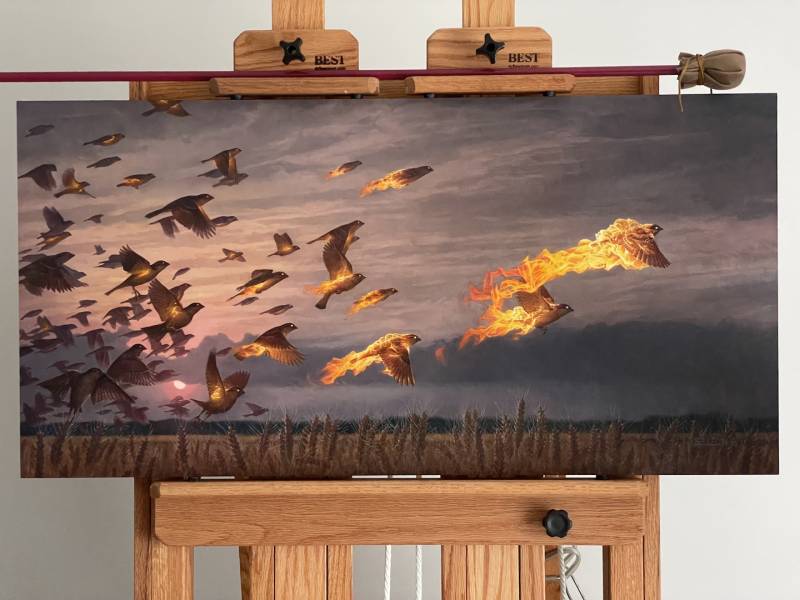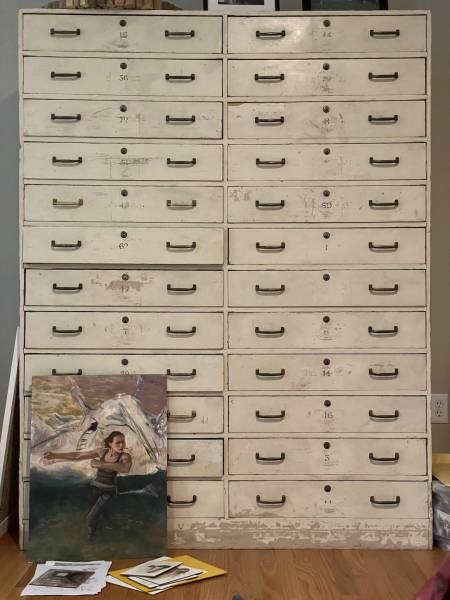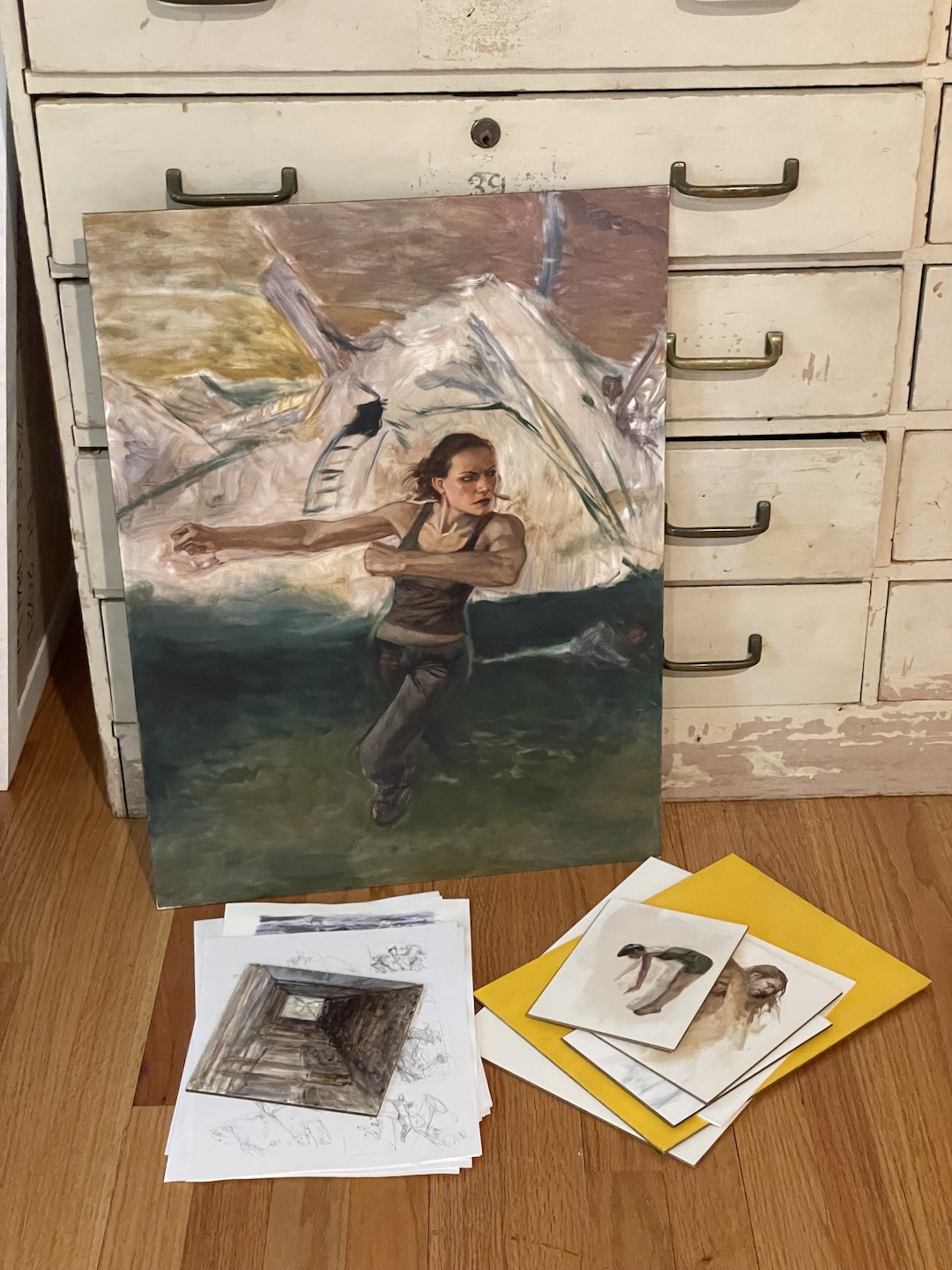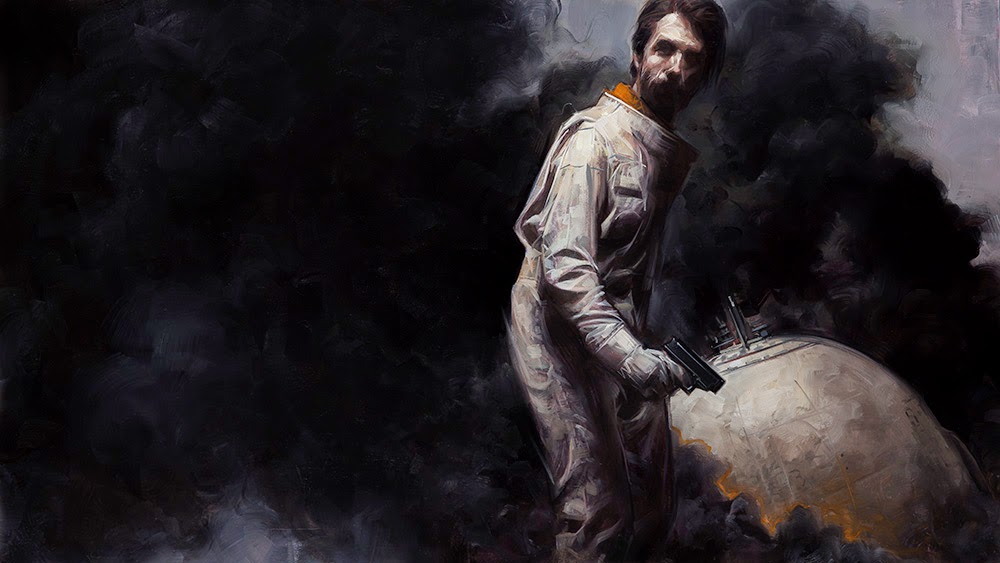As Da Vinci allegedly wrote, art is never finished only abandoned. Personally, I have abandoned a lot of art…most of it long before it even resembled anything even approaching “finished.” This wasn’t client work, mind you. I’ve always managed to find a way to at least hobble over the finish line with client work. But personal work? I’ve started many, many paintings and walked away somewhere in the middle…sometimes closer to the beginning.
My reasoning for walking away from each is varied. Some were the victims of paid gigs getting in the way, others were in need of additional reference that I just never found or bothered to get. But mostly, they’re pieces that I lost interest in halfway through, or more likely, lost confidence in.
A lack of confidence and self-doubt are two things I’ve struggled with off and on my entire life. In my head, I’m never as good as I think I should be, and work that I’ve done is never as good as anyone says it is. These feelings aren’t crippling, mind you, but sometimes they put my head in a space that is a little dark, a little lonely.
It’s at this point that I would share with you the many coping mechanisms I have developed that may help you if you too suffer from similar feelings, but I don’t really have any. All I know how to do is keep moving forward and continuing to push myself to do my best—even if my brain keeps telling me that’s not good enough. Beyond that I try and trust the positive feedback of my art directors and peers. After all, if the folks who hire me felt the same way I do about myself, they’d never have hired me in the first place, and generally my peers will be honest—some of them brutally so.
With commercial work, I try and take the time to do what I can to ensure that even pieces that I don’t love (at the time) have a good amount of polish. I try to make sure I’m on deadline and I try and produce work that makes the client happy. With all things professional, I finish what I started, regardless of how I feel about it.
Personal work is a very different thing. I don’t have a lot of interest in being bored or feeling bad about myself for free and since I don’t rely on my personal work for income, I’m not going to slog through something just because I’m supposed to. The only work I want to follow through on is the stuff that is exciting to me—even if I’m the only one that’s excited by it. I’m not a fast painter, and so I live with imagery a long time. If it becomes stale in my head, it’ll become stale on the board, and the moment that happens it’s not worth following through to me.
That’s not to say that these incomplete pieces aren’t valuable in some way. In fact, they are—they often impart important lessons in the doing. But that doesn’t mean they deserve more time invested and a frame at the end. The sunk cost fallacy is not a trap I want to get into, and walking away can very much be an act of self-preservation for me because I tend to start digging a hole of self-loathing when things aren’t going well or if the personal work isn’t what I wanted it to be.
Now, walking away falls very counter to the work ethic I’d been brought up with. I definitely grew up with “finish what you started” drummed into my head. Maybe that had more to do with the stuff that was on my dinner plate, but I used to think that it was somehow wasteful or bad to walk away from projects. I can’t say rightly when my mind changed on that, but it’s just something I’ve become more comfortable with over my couple decades of doing this full-time.
I’d like to say that I don’t abandon things cavalierly, but that would be something of a lie. Sometimes I start a piece and a third of the way into it, I just look at it and…well, it sort of becomes a “nope.” But I do think it’s valuable to take some time to ask questions before hitting the eject button. Why don’t you love this anymore? Is it too challenging? Is it the kind of challenge you don’t enjoy? Did you start this off in the wrong medium? Is the basic idea salvageable? Is it just the wrong way to execute this?
Obviously I actually do complete and have completed plenty of personal works—everything from little pen and ink doodles to oil paintings that required a fair amount of research and deep reference dives (I’ve even been known to post about some of them on this very blog). But the pieces that I tend to take all the way to “finish” are the pieces that keep breathing throughout the journey, the ones my fingers keep itching to dig back into. They also tend to be the ones that most reflect me and my interests, and so they’re generally worth every second spent on them.
Of course those personal works often have fits and starts. Sometimes I think a piece is finished, but it keeps nagging at me. Other times I get stuck in the middle and it takes a while to find the path forward. But like I said, I pick at things. I don’t have the laser focus, the speed or precision to get an idea, nail it down and execute it. I admire folks who do, and I like to think that I have to potential to join the ranks of such folk. In reality, I’m still figuring out what I like to paint, what I like in my work, and how to do more of both without getting dragged down by my own brain in the process.

This piece is still not finished. I thought it was once, but I realized that there’s something about it that’s off still. Still working out how to proceed, but its still pretty exciting to me, so I keep at it.
So what about all those the half-baked pieces—the ones that were set aside (seemingly) permanently? I still have a ton of them. In fact, I’ve even paid to move them across the country more than once (the second time there were more of them). Some of them I have no intention of ever getting back to and will eventually be sanded down or painted over. Others sort of just sit there, awaiting the day that I might figure out a new direction to take them. Those are a collection of zombie works, neither living nor dead and all awaiting a chance to get their hands on my brain. They may be abandoned, but they still contain stored potential. I just need to find something about them I can be interested in again.

For context, the biggest piece there is 18×24 and the pile came out of one of these drawers. I’d be lying if I said that every drawer was full of unfinished work, but more than a few of them are.
Before I go, I want to thank fellow illustrator John Tedrick for inspiring this article. Always asking good questions on Facebook, and painting cool stuff. I really appreciate the prompt on this one, since I’m in a work hole and my brain is fried.
Until next time, take care of yourselves out there.









Hey Steven! First of all, thank you very much! That said, reading your articles in the morning, with that first coffee and cigarette, has always been refreshing. Realizing that details, which sometimes sound so silly in daily self-demands, are also experienced by other humans, and even more, by others that I admire so much work, brings me back to a sense of reality. They remind me of the good side of art and how much I pay and will always willingly pay the real price of being an artist.
I really appreciate your sincerity in writing and the way you approach your art. Thank you so much for sharing it. This, without a doubt, does a huge good for the community. Always stay firm on your art journey, because just like today, I feel less E.T., I record this gratitude, for the rest of your life you know that there are people around who came from the same world as you.
Whoa. Thank you for this. I confess that I don’t have a ton of confidence in pretty much anything I write for Muddy Colors. It’s really nice to know that folks like yourself appreciate my contributions. Thank you very much for saying this.
Thank you so much for this post, and I totally agree with the previous commenter – I bookmark Muddy Colors posts that I find valuable and know I’ll want to come back to later, and quite a few of yours are there in my bookmarks! This post is going right there in that folder too, any time I look at my unfinished pieces and start feeling bad about them. Oftentimes it leads to such self-defeating sentiments as “why can’t I finish what I started…” but reading your experience here reminds me that not finishing some things is NOT a character flaw, and like you, I have all sorts of valid reasons for either setting certain pieces aside (usually because I realize some particular skill isn’t up to par yet, and I need to work on that first), or simply because that idea just doesn’t feel as exciting any more. Those I gesso over and re-use the surface. Learning to recognize and avoid the sunk cost fallacy is one of the healthiest things I’ve ever done for myself – particularly, as you point out, we learn so much from a piece regardless of finish, and that in itself is worth the time spent. Thank you again!
Thank you! I’m really happy you figured this stuff out. It took me an unreasonable amount of time to “get it”, but it really changed my life. If I ever move on to doing mostly personal works instead of commercial art, then I’ll have to revisit things and build a new pattern for sure, but I’ll try to do it in a way where I keep that self-forgiveness going. But then, I’ll also be starting a lot more works, so statistically speaking, I’ll be finishing a lot more than I do now anyway. Maybe it would balance out. I guess if things change, I’m going to find out the hard way.
Anyway, I appreciate the comment and the kind words.
Thanks Steven, so good to hear other artist do the same as me. I find it very hard to keep painting something I am not excited about. I am also very very clever at putting off “starting” a painting, until I get sick of myself and my excuse’s and just end up feeling frustrated with myself. I think it all comes from self doubt. Are we all a bit like this? I’m not sure but it was reasurring reading your post, thank you XO
I feel like it’s very common to feel that way, but because we tend to be in our separate enclaves, it tends to feel like we’re the only ones feeling the way we feel. I’ve personally had that self-doubt begin to creep and grow because I thought those feelings were unusual and just a me thing. Before I knew it, I was doubting every aspect of my process, the palette I was using…pretty much everything. It was a huge relief to me when I learned that all these folks that I thought were complete masters of their craft had similar doubts. In fact, it was freeing. I’ve tried to be as vocal about this stuff as I can because…well, I want to normalize it.
As for the starting thing? Yeah. That’s ALWAYS the hardest part of every day for me. I always find that once I’m doing it, I fall into a groove—even if I’m struggling. But it takes more effort to get me moving than anything else.
Thanks for commenting!
Always a pleasure to read your articles Steven. I agree, all personal works, are time well spent when you have the chance to develop them. Sometimes they become key landmarks in your artistic Journey.